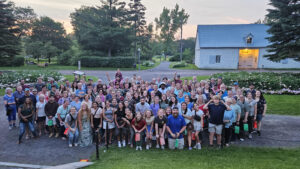
NASHVILLE, Tenn. (BP)–An invitation by the Vatican for Anglicans to enter full communion with the Catholic Church while preserving elements of their liturgical heritage could mean an increase in the number of married Catholic priests, leading to a possible reexamination of the celibacy requirement altogether.
During a news conference Oct. 20, the Vatican announced a desire for the Catholic Church to serve as a refuge of sorts for conservative Anglicans who disagree with the church’s recent acceptance of women priests and openly homosexual bishops.
The New York Times described the move as an effort “to capitalize on deep divisions within the Anglican Church to attract new members at a time when the Catholic Church has been trying to reinvigorate itself in Europe.” Some Anglican and Catholic leaders even expressed shock at the news, The Times said.
Experts expect the offer to appeal more to Europeans than to Anglicans in America, where conservatives already have formed an alternative to the increasingly liberal Anglican Communion. But in England, The Times said entire parishes or even dioceses could leave the church and set off battles over ownership of church buildings and land.
Bishop Martyn Mimms of the newly formed Anglican Church in North America welcomed the pope’s invitation.
“It demonstrates his conviction that the divisions in the Anglican Communion are very serious and these are not things that are going to get papered over,” Mimms told The Times.
He added that he didn’t expect many conservative Anglicans to take advantage of the offer because the theological differences are significant.
“I don’t want to be a Roman Catholic. There was a Reformation, you remember,” Mimms said.
But if enough Anglican priests decide to become Catholics, the Vatican could have a new debate on its hands regarding celibacy. The Catholic Church already allows married Anglican priests to convert and become Catholic priests while maintaining their marital status, but in the past few priests have chosen that route.
Some are speculating that as parishioners become accustomed to married priests who were formerly Anglicans, there will come a call for men who have always been Catholic to be allowed to marry.
“If you get used to the idea of your priests being married, then that changes the perception of the Catholic priesthood necessarily,” Austen Ivereigh, a Catholic commentator in London, told The Times.
“We face the prospect in the future of going to a Catholic church in London and it being normal to find a married Catholic priest celebrating at the altar, with his wife sitting in the third pew and his children running up and down the aisle,” he said.
HEALTH ALERTS ISSUED FOR CONGREGATIONS — The National Council of Churches has released a checklist to assist congregations in avoiding the spread of germs, especially H1N1, in the coming months.
“Members of congregations are urged to use hand sanitizers, clean door knobs and hand rails, and fill candy dishes with individually wrapped candies,” the Oct. 15 news release said.
Church members also are encouraged to stop shaking hands and hugging one another during the traditional “passing of the peace,” NCC said, and instead they should acknowledge one another with a nod.
“Congregations who use disposable plastic cups for communion are well situated for evading the H1N1 and other influenza viruses,” NCC said. “Other congregations are urged to suspend use of the common cup and the practice of ‘intinction’ — dipping the bread into the wine — because of their germ-carrying potential.”
The council also advised churches to post a plan for cancelling worship services and other activities during a flu outbreak.
Russell Moore, dean of the school of theology and senior vice president for academic administration at Southern Baptist Theological Seminary, admitted on his blog that he has several bottles of hand sanitizer at his disposal as he tries to avoid H1N1, but he believes the common cup is too important to throw away.
Table fellowship, he said, is a sign of familial solidarity and of the messianic reign. Moore often encourages churches to return to the use of a common loaf and a common cup, recovering the sign of the bread being torn rather than “daintily picked up in the pre-fabricated bits.” He’s not offended when people disagree with him on the subject, but he is stunned that so often people simply want to avoid germs.
“The common cup is, well, gross to many Christians because they don’t like the idea of drinking after strangers. That’s just the point,” Moore wrote Oct. 20. “You’re not drinking after strangers. You’re drinking after your own flesh-and-blood, your family. And the offense is precisely the issue. You’re recognizing Christ Jesus, discerning his Body, in the ‘flesh’ of his Body the church around you. If drinking after your brothers is ‘disgusting,’ then how much more eating Jesus’ flesh and drinking his blood. That was disgusting to an assembly a while back as well.
“Now, I’m not calling on churches to pick up the common cup and the common loaf in the middle of a swine flu pandemic. That wouldn’t be prudent. But maybe now’s the time to start thinking about how our hyper-hygienic American culture might be leading us toward cleanliness and away from Christ,” Moore wrote.
DIGITAL BIBLE OFFERS INTERACTIVE EXPERIENCE — Newsweek magazine featured recently the invention of a digital Bible called Glo (pronounced “glow”), which includes “HD video, photographs, maps, reading plans, 360-degree virtual tours and a unique zoomable interface for fast, easy, visual navigation on PC computers.”
“Designed for people who prefer to read while they’re watching TV and texting and downloading music, GLO is to the Bible what SimCity is to the comic book: an interactive scriptural immersion experience,” Newsweek said.
For instance, when reading Exodus 25 about the building of the tabernacle, the user can click on an image of the structure and see it from various angles, and even go inside to see the Ark of the Covenant.
Glo was developed by a Brazilian evangelical Christian and a Taiwanese businessman who was ordained at Fuller Theological Seminary in California. The goal, they said, is to change the way people interact with Scripture.
Newsweek noted that during the Reformation, Scripture moved from the hands of the few to the hands of the many, thanks in part to the technology of the printing press and also to the efforts of the Reformers to translate the Bible into the languages of the world.
The developers hope the digital Bible will introduce the content to a new generation of people who don’t read books. Glo is available at amazon.com.
–30–
Erin Roach is a staff writer for Baptist Press.















